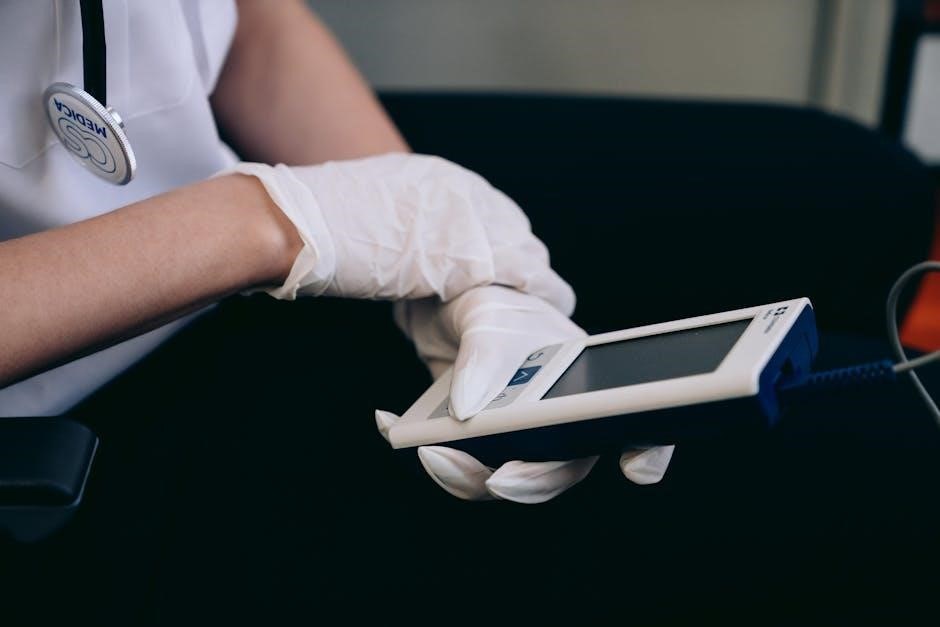The Dawn Apgar Clinical Exam Guide is a comprehensive resource for ASWB Clinical Exam preparation, offering detailed content review, practice tests, and expert strategies to ensure success․
1․1 Overview of the Guide and Its Importance
The Dawn Apgar Clinical Exam Guide is a comprehensive resource designed to help social workers master the ASWB Clinical Exam․ It covers all exam content areas, KSAs, and provides strategies for success․ With updated practice questions and detailed explanations, the guide ensures readiness for the exam’s challenges, making it an essential tool for achieving licensure and advancing professional practice in clinical social work․
1․2 Target Audience and Exam Objectives
The Dawn Apgar Clinical Exam Guide is tailored for social workers preparing for the ASWB Clinical Exam, particularly those seeking clinical licensure․ Its primary goal is to enhance exam readiness by focusing on clinical knowledge, practical application, and ethical decision-making․ The guide equips candidates with the tools to demonstrate competence in assessment, diagnosis, and treatment planning, ensuring they meet the exam’s rigorous standards for clinical social work practice․
Exam Content and Structure
The exam includes 170 multiple-choice questions, covering clinical concepts, case studies, and ethical dilemmas․ It assesses critical thinking and practical application of clinical social work knowledge within 4 hours․
2․1 Breakdown of the ASWB Clinical Exam Content
The ASWB Clinical Exam consists of 170 multiple-choice questions, divided into content areas: Human Development, Diversity, and Behavior in the Environment (25-30%), Assessment, Diagnosis, and Treatment Planning (30-35%), Psychotherapy, Clinical Interventions, and Case Management (30-35%), and Professional Values and Ethics (5-10%)․ Each question evaluates clinical judgment and critical thinking, emphasizing the application of theoretical knowledge to real-world scenarios․
2․2 Understanding the Question Types and Formats
The ASWB Clinical Exam features diverse question formats, including scenario-based, case study, and knowledge recall questions․ These assess competencies like assessment, diagnosis, and treatment planning․ Many questions present clinical vignettes, requiring test-takers to apply ethical standards, theoretical knowledge, and critical thinking․ Understanding these formats helps candidates anticipate and approach questions effectively, ensuring thorough preparation and confident performance during the exam․

Knowledge, Skills, and Abilities (KSAs)
KSAs are core competencies assessed in the exam, including assessment, diagnosis, treatment planning, and case management․ The guide provides strategies to master these critical areas effectively․
3․1 Identifying and Mastering Key KSAs for the Exam
Mastering KSAs requires understanding the exam’s focus areas, such as assessment, diagnosis, treatment, and case management․ The guide provides detailed strategies to identify and strengthen these competencies, ensuring readiness for clinical scenarios․ Practice questions and case studies help applicants apply KSAs effectively, while study tips guide prioritization of key areas based on exam emphasis․
3․2 Linking KSAs to Real-World Clinical Scenarios
The guide emphasizes connecting KSAs to practical clinical situations, ensuring exam readiness․ Case studies and simulations help applicants apply knowledge, skills, and abilities to real-life challenges․ This approach fosters critical thinking and problem-solving, mirroring the exam’s focus on practical application․ By linking KSAs to tangible scenarios, candidates improve their ability to analyze and respond to diverse clinical situations effectively․

Test-Taking Strategies and Tips
Mastering test-taking strategies is crucial for success․ Focus on time management, question parsing, and eliminating distractors․ Practice active reading and targeted answering to enhance accuracy and confidence during the exam․
4․1 How to Parse Questions Effectively
Parsing questions effectively involves carefully reading each question, identifying key elements, and understanding what is being asked․ Focus on the main query, recognize distractors, and eliminate obvious incorrect answers․ Use the process of elimination to narrow down choices․ Manage time by allocating specific seconds per question, ensuring thorough analysis without overthinking․ This systematic approach enhances accuracy and reduces exam stress․
4․2 Avoiding Common Pitfalls and Mistakes
Recognize common pitfalls like rushing through questions or misinterpreting stems․ Develop strategies to avoid these, such as careful reading and logical guessing․ Maintain a steady pace and stay calm․ These practices help manage time effectively, reduce errors, and enhance overall performance and confidence during the exam․

Practice Tests and Exam Preparation
Engage in timed practice tests to simulate exam conditions, assess strengths, and identify areas for improvement․ This structured approach enhances readiness and builds confidence for the actual exam․
5․1 Features of the Full-Length Practice Tests
Full-length practice tests mimic the actual exam, featuring 170 questions, timed sections, and diverse clinical scenarios․ They include detailed answer explanations, covering key concepts and reasoning․ The tests assess knowledge, application, and critical thinking, providing a realistic simulation of exam conditions․ Regular use helps build stamina, reduce anxiety, and refine test-taking strategies, ensuring comprehensive preparation for the clinical exam․
5․2 Analyzing Correct and Incorrect Answers
Analyzing answers helps identify knowledge gaps and strengthens understanding․ Correct answers provide clear rationales, while incorrect ones highlight areas for review․ This process improves critical thinking and reduces errors in future attempts․ Regular review enhances learning retention and builds confidence in applying clinical knowledge effectively during the exam․

Learning Style Assessment and Study Planning
Assessing your learning style helps tailor study methods to your preferences, enhancing retention and understanding․ A structured plan ensures efficient use of time and resources․
6․1 Understanding Your Learning Style
Identifying your learning style—visual, auditory, or kinesthetic—helps tailor study strategies to your strengths․ Assessments like quizzes or surveys can reveal preferences, guiding effective study methods․ Recognizing how you process information enhances retention and engagement, making exam preparation more efficient and personalized․ This self-awareness is key to maximizing study time and achieving success on the clinical exam․
6․2 Creating a Personalized Study Plan
Developing a tailored study plan involves setting clear goals, allocating time wisely, and focusing on weak areas․ Assess strengths and prioritize challenging topics, ensuring balanced coverage of all exam content․ Regularly review progress, adjust schedules as needed, and incorporate active learning techniques to stay engaged․ A well-structured plan enhances efficiency and confidence, aligning study efforts with exam success․

Overcoming Test Anxiety and Building Confidence
Techniques like deep breathing, positive visualization, and mindfulness can reduce anxiety․ Focus on preparation and past successes to build confidence and stay calm during exams․
7․1 Strategies to Manage Exam Day Nerves
Begin with deep breathing exercises to calm your mind and body․ Arrive early to familiarize yourself with the exam environment․ Practice positive affirmations to boost confidence․ Stay hydrated and maintain a healthy snack routine․ Engage in light physical activity before the exam to reduce tension; Use mindfulness techniques to focus on the present moment and avoid overthinking․
7․2 Building Resilience and Exam Confidence
Develop resilience by embracing challenges as growth opportunities․ Foster confidence through consistent practice and mastery of clinical concepts․ Celebrate small victories to reinforce self-belief․ Visualize success to maintain a positive mindset․ Focus on your strengths while addressing weaknesses systematically․ Remind yourself of your extensive preparation and the skills you’ve honed․ Confidence grows with deliberate effort and self-compassion․
Clinical Knowledge and Application
Clinical knowledge is foundational for the exam, focusing on assessment, diagnosis, and evidence-based interventions․ Apply theoretical concepts to real-world scenarios, ensuring accurate decision-making and effective client care․
8․1 Essential Clinical Concepts for the Exam
The exam emphasizes key clinical concepts, including biopsychosocial assessment, DSM-5 diagnostic criteria, evidence-based interventions, and ethical considerations․ Mastery of these areas ensures a strong foundation for clinical practice and exam success․ Focus on understanding human development, psychopathology, and cultural competence to apply knowledge effectively in diverse scenarios․
8․2 Applying Theoretical Knowledge to Practical Scenarios
Applying theoretical knowledge to real-world scenarios is crucial for exam success․ This involves linking concepts like assessment, diagnosis, and intervention to case studies․ Practice analyzing clinical vignettes to recognize patterns and appropriate responses․ This skill enhances critical thinking and prepares you to address diverse client situations effectively during the exam and in professional practice․

Case Study Analysis and Problem-Solving
Mastering case study analysis and problem-solving is essential for the exam․ These skills help apply clinical knowledge to real-life scenarios, ensuring effective decision-making and client care․
9․1 Approaching Case Studies Systematically
Approaching case studies systematically involves identifying key components, assessing client situations, and applying clinical knowledge․ Start by gathering all relevant information, then analyze presenting issues, strengths, and limitations․ Consider cultural, ethical, and legal factors that influence interventions․ This structured method ensures comprehensive understanding and effective decision-making, helping you select the most appropriate responses during the exam․
9․2 Developing Strong Problem-Solving Skills
Developing strong problem-solving skills requires analyzing complex clinical scenarios, identifying key factors, and applying relevant theories․ Practice breaking down problems into manageable parts, prioritize client needs, and evaluate potential interventions․ Use active reasoning to connect knowledge, skills, and abilities (KSAs) to real-world situations․ Regular practice with diverse case studies enhances critical thinking and improves decision-making accuracy for the exam and clinical practice․
Time Management and Exam Pacing
Effective time management and pacing are crucial for completing the exam․ Allocate time wisely, balancing thoroughness with efficiency to avoid rushing․ Maintain steady progress․
10․1 Strategies for Effective Time Management
Mastering time management is essential for success․ Allocate a set amount of time per question to ensure completion․ Prioritize skimming the exam first to identify easier questions, then tackle challenging ones․ Use practice tests to refine pacing and avoid overthinking․ Employ the “educated guess” technique for unclear answers to stay within time limits and maintain exam momentum effectively․
10․2 Pacing Yourself During the Exam
Consistent pacing ensures balanced progress․ Divide total exam time by the number of questions to establish a per-question timeframe․ Set mental checkpoints to track progress without frequent clock-checking․ Stay calm and avoid rushing, even when facing tough questions․ Maintain steady momentum to complete all questions within the allotted time, balancing speed and accuracy for optimal performance․

Exam Day Preparation and Logistics
Ensure you’re well-rested and arrive early at the test center․ Bring required documents, ID, and any permitted items like snacks or water for comfort during the exam․
11․1 Final Preparations Before the Exam
Ensure a restful night’s sleep and maintain a healthy routine․ Review key notes and concepts from the Dawn Apgar guide but avoid last-minute cramming․ Plan nutritious meals, hydrate, and charge all necessary devices․ Lay out attire and gather required documents to avoid delays․ Double-check the exam location and travel plans to ensure a smooth journey․ Stay calm and focus on managing any pre-exam anxiety․
11․2 Navigating the Exam Environment
Arrive early to familiarize yourself with the test center layout․ Complete the check-in process promptly and store personal belongings securely․ Use the provided tools, such as a calculator or scratch paper, effectively․ Manage your time wisely, ensuring you complete all sections․ Stay focused and avoid distractions to maintain concentration throughout the exam․ Adapt to the environment to optimize your performance and comfort․
Post-Exam Actions and Next Steps
Review your exam results, understanding strengths and areas for improvement․ If passed, proceed with licensure; if not, analyze performance and plan a focused study strategy․
12․1 Understanding Your Exam Results
After receiving your results, carefully review the scoring breakdown to identify areas of strength and improvement․ Understand whether you passed or need to retake the exam․ Use the detailed feedback to refine your knowledge gaps and adjust your study plan accordingly․ This analysis is crucial for informed decision-making and future preparation․
12․2 Next Steps After Passing the Exam
After passing, apply for your clinical social work licensure through your state board․ Update your professional credentials and resume to reflect your achievement․ Consider pursuing advanced certifications or continuing education to enhance your expertise․ Stay updated on industry standards and best practices to maintain competence․ Celebrate your success and share it with professional networks to expand opportunities․

Additional Study Resources and Tools
The Dawn Apgar Clinical Exam Guide offers additional resources, including practice tests and online forums, to supplement your studying and exam preparation effectively․
13․1 Recommended Study Materials Beyond the Guide
Beyond the Dawn Apgar Clinical Exam Guide, consider utilizing textbooks like the DSM-5, online courses from ASWB or NACSW, and flashcards like Quizlet for key terms․ Supplementary materials such as practice exams from SocialWorkExam or AATBS can enhance your preparation․ Additionally, join study groups or forums like Reddit’s social work community for peer support and shared resources to strengthen your exam readiness effectively․
13․2 Leveraging Online Study Communities
Engage with online forums like Reddit’s r/socialwork or specialized Facebook groups for social work exam prep․ Participate in discussions, share resources, and learn from others’ experiences; Join live Q&A sessions or webinars hosted by exam prep platforms․ These communities offer valuable insights, advice, and support, helping you stay motivated and informed throughout your study journey․

Real-Life Examples and Success Stories
Inspiring tales of examinees who excelled using the guide, highlighting practical strategies, boosted confidence, and improved problem-solving skills․ Many reported high scores on practice tests and licensure success․
14․1 Lessons Learned from Previous Exam Takers
Exam takers praised the guide’s structured approach, emphasizing the importance of timed practice tests and consistent study plans․ Many highlighted how the guide helped them understand clinical scenarios better, while others noted improved time management and reduced exam-day stress․ A common theme was the value of focusing on high-probability questions and applying theoretical knowledge to real-world cases effectively․
14․2 Success Stories from Guide Users
Many users reported passing the exam with confidence after using the guide, citing its clear structure and relevant content․ Testimonials highlight how the guide’s practice tests and KSAs improved their problem-solving skills․ Several users shared stories of overcoming anxiety and achieving success, attributing their results to the guide’s comprehensive approach and practical strategies for mastering clinical scenarios․
Frequently Asked Questions (FAQs)
- What is the exam format? It includes multiple-choice questions․
- How long is the exam? Typically, 170 questions in 4 hours․
- What is the passing score? It varies, set by ASWB․
- Can I retake the exam? Yes, after 90 days․
15․1 Common Questions About the Exam and Guide
- What is covered in the Dawn Apgar Clinical Exam Guide? It offers comprehensive preparation for the ASWB Clinical Exam․
- How many questions are on the exam? There are typically 170 multiple-choice questions․
- What is the time limit? Candidates have 4 hours to complete the exam․
- Can I use the guide for other exams? It is specifically designed for the ASWB Clinical Exam․
- Are practice tests included? Yes, the guide provides full-length practice exams․
15․2 Addressing Concerns and Misconceptions
Common concerns include the exam’s difficulty and the guide’s effectiveness․ Many worry about the breadth of content, but the guide focuses on high-yield topics․ Others question the relevance of practice tests, yet they mimic real exam conditions․ Addressing these, the guide provides clear strategies and explanations to build confidence and competence, ensuring exam readiness․
Mastering the Dawn Apgar guide ensures confidence and readiness for the clinical exam․ Stay focused, apply strategies, and trust your preparation for success and professional growth․
16․1 Summarizing Key Takeaways
The Dawn Apgar guide serves as a comprehensive roadmap for mastering the clinical exam․ It emphasizes understanding exam structure, focusing on KSAs, and applying clinical knowledge․ Effective test-taking strategies, thorough practice, and time management are crucial․ Stay calm, trust your preparation, and approach questions systematically․ Regular review and reflection on practice tests will enhance confidence and readiness for success․
16․2 Final Motivation and Encouragement
Remember, you are well-prepared and capable of excelling․ Trust in your abilities and the effort you’ve invested․ Stay focused, draw on your knowledge, and approach the exam with confidence․ Celebrate your dedication and embrace the opportunity to showcase your skills․ Your hard work will pay off—go forward with determination and claim your success!
